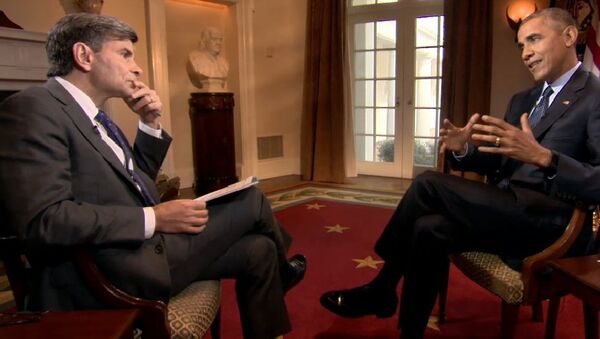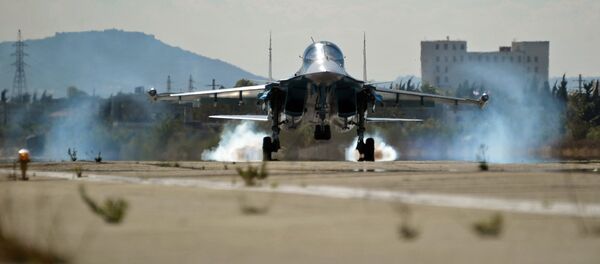The interview airing Friday, has already become the subject of a scandal, with commentators attacking the president for his suggestion that ISIL had been "contained" just hours ahead of the deadly terror attacks in Paris.
In the same interview, asked by his interviewer about whether "Vladimir Putin will start to take [ISIL] on," (an odd question, given that Russia has been bombing ISIL positions for a month and a half), Obama offered an equally strange response.
Starting off by noting that he sincerely believes that "Putin…from the start has been sincere in seeing ISIL as a threat," the president turned around and contradicted himself in the same breath, suggesting that "the reason he went into Syria is not primarily because of ISIL, but to prop up Assad."
With this in mind, the president said, "part of our goal is to underscore for him and for everyone in the region that ISIL is the primary threat and you can't solve the ISIL problem if, in fact, you've got a country that is governed by somebody who's illegitimate and that the majority of Syrians reject." This is an especially peculiar line for the president to take given that his own approval ratings have dipped below 50% on numerous occasions in the course of his own presidency.
With these remarks, the president clarified that he is set on continuing to ignore internationally recognized definitions of legitimacy, which suggest that not only is Assad Syria's legitimate president, but that the Russian air campaign, conducted on the request of Syria's government, is in fact the only legitimate use of foreign air power on Syrian territory.
Asked whether it will be possible to convince Putin on Assad's "illegitimacy" and to come to the negotiating table, Obama noted that "what's interesting is we've already seen I think a growing awareness on the part of the Russians after several weeks now of fairly high paced bombing that they're not going to win this militarily. I think they understand that. They may not admit it publicly, but you're already starting to see indications of that."
The president's definitions of military success in Syria aside, it's worth pointing out, as a number of analysts already have, that Syrians themselves have deemed Russia's month and a half long campaign of airstrikes to be much more effective than the US-led coalition's year and a half long effort, costing less, leading to an increase in Syrian army offensives against the terrorists, and resulting in over a million Syrians returning home from refugee camps abroad. What fantastical successes Obama may want from the Russian effort in such a short period of time remains unclear.
The president could not seem to clarify how exactly US diplomacy will be able to convince Moscow and Tehran to abandon its ally in Damascus, but asserted that "if we can keep pushing on that diplomatic track even as we're squeezing ISIL…then what you see over the course of the next year is I think the possibility that our 60-member coalition and the approach that we're taking is one that Russia [may join]."



